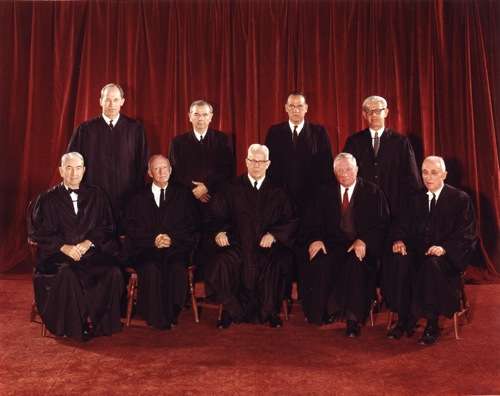Last month, the Supreme Court denied cert in Patterson v. Walgreen. The petitioner in that case called on the Court to reconsider TWA v. Hardison (1977). Justice Alito dissented from the denial of cert, joined by Justices Thomas and Gorusch. He wrote:
I agree with the most important point made in that brief,namely, that we should reconsider the proposition, endorsed by the opinion in Trans World Airlines, Inc. v. Hardison, 432 U. S. 63, 84 (1977), that Title VII does not require an employer to make any accommodation for an employee’s practice of religion if doing so would impose more than a de minimis burden. . . .
As the Solicitor General observes, Hardison’s reading does not represent the most likely interpretation of the statutory term “undue hardship”; the parties’ briefs in Hardison did not focus on the meaning of that term; no party in that case advanced the de minimis position; and the Courtdid not explain the basis for this interpretation. See Brief for United States as Amicus Curiae 19–21. I thus agreewith the Solicitor General that we should grant review inan appropriate case to consider whether Hardison’s interpretation should be overruled.*
Yesterday, the Sixth Circuit decided Small v. Memphis Light, Gas, and Water. The per curiam opinion followed Hardison. But Judge Thapar, joined by Judge Kethledge, wrote a concurrence that called on the Court to reconsider Hardison. Judge Thapar sketches how Hardison made up the “de minimis” test. He also rejects any implicit argument that Hardison‘s holding was needed to avoid an Establishment Clause violation. Here is his argument, which relies on scholarship from Professors Michael McConnell and Mark Storslee:
As for the implicit reason—acknowledged only by the Hardison dissent—the majority may have construed Title VII so narrowly because it feared that a broader reading might run afoul of the Establishment Clause. See Hardison, 432 U.S. at 89–90 (Marshall, J., dissenting). Yet whatever doctrinal merit that concern once may have had, I seriously doubt that it remains valid. Even properly read, Title VII doesn’t require employers to provide any and all accommodations; it requires them to provide only those accommodations that won’t impose an “undue hardship” on the company—meaning significant costs. That seems more than fine under the Establishment Clause. See, e.g., Cutter v. Wilkinson, 544 U.S. 709, 722–24 (2005); Estate of Thornton v. Caldor, Inc., 472 U.S. 703, 711–12 (1985) (O’Connor, J., concurring); Michael W. McConnell, Accommodation of Religion: An Update and a Response to the Critics, 60 Geo. Wash. L. Rev. 685, 704 (1992); see generally Mark Storslee, Religious Accommodation, the Establishment Clause, and Third-Party Harm, 86 U. Chi. L. Rev. 871 (2019) (challenging the theory that religious accommodations violate the Establishment Clause whenever they impose more than de minimis costs).
In any event, the doctrine of constitutional avoidance doesn’t give courts license to rewrite a statute. See, e.g., Jennings v. Rodriguez, 138 S. Ct. 830, 836 (2018). But the Hardison majority appears to have done exactly that. The only other explanation is that the majority stumbled through the looking glass and into “an Alice-in-Wonderland world where words have no meaning[.]” Welsh v. United States, 398 U.S. 333, 354 (1970) (Harlan, J., concurring in the judgment).
Of course, all this does not mean that employers must always accommodate their employees’ religious beliefs and practices. The term “undue hardship” makes clear “that this is a field of degrees, not a matter for extremes” or “absolutes.” E.E.O.C. v. Firestone Fibers & Textiles Co., 515 F.3d 307, 313 (4th Cir. 2008); cf. Barnett, 535 U.S. at 402. But Hardison itself adopted an “absolute” when it “effectively nullifi[ed]” the accommodation requirement. Hardison, 432 U.S. at 89 (Marshall, J., dissenting). And without any real reason.
The irony (and tragedy) of decisions like Hardison is that they most often harm religious minorities—people who seek to worship their own God, in their own way, and on their own time. See McConnell, supra, at 693, 721–22; Storslee, supra, at 873–74, 877. The American story is one of religious pluralism. The Founders wrote that story into our Constitution in its very first amendment. And almost two-hundred years later, a new generation of leaders sought to continue that legacy in Title VII. But the Supreme Court soon thwarted their best efforts. Even at the time, this “ultimate tragedy” was clear. Hardison, 432 U.S. at 97 (Marshall, J., dissenting) (“[O]ne of this Nation’s pillars of strength our hospitality to religious diversity has been seriously eroded.”).
This argument may soon garner four votes for cert, and give votes for reversal of Hardison.
from Latest – Reason.com https://ift.tt/3cTPnJL
via IFTTT
